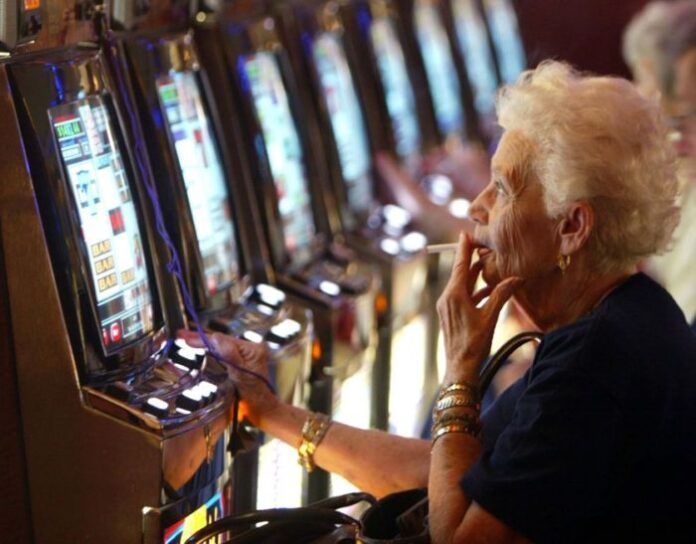The Charleston Post & Courier reported yesterday Horry County Councilman Mark Lazarus’ statements on building casinos in Myrtle Beach: “I think it’s something worth looking at,” Lazarus said.
The National Association of Realtors found “the impact of casinos on neighboring property values is unambiguously negative.” This is because they are designed to be all absorbing environments and do not release their customers until they have spent all their money.
Reports from Charleston Post and Courier state: With the chances of a gas-tax increase to pay for road repairs dwindling, advocates of bringing casinos to South Carolina think they have found a winning hand.
The newspaper also gave a statement from gambling casino lobbyists: Casinos in the Myrtle Beach area and along the borders of North Carolina and Georgia could have South Carolina cashing in a potential $500 million a year while not raising gas pump prices or adding to the state debt load, legalized gambling backers say.
“I think that the amount of support for luxury casinos is already there,” said S.C. House Minority Leader Todd Rutherford, who lives in Columbia, S.C. and proposed the casino bill. Casinos is simply the best way to raise that new revenue.”
Casino backers have a new ally in Horry County Council Chairman Mark Lazarus, a Myrtle Beach Republican businessman. Bringing casinos to the beach could help pick up business in the slower winter months.
“I think it’s something worth looking at,” Lazarus said.
Other local S.C. Senators do not believe casinos are a great idea at all, however. “I think it’s a terrible way to raise revenue for roads,” North Myrtle Beach Republican Sen. Greg Hembree said. “It might be a way to raise revenue, but the casino industry, it’s not the golden goose that it once was.”
The Myrtle Beach Peoples Rally successfully challenged the Senate Rutherford sponsored Casinos legislation in 2013. Rutherford of Columbia and Sen. Gerald Malloy of Hartsville, both Democrats, introduced legislation again this year that would ask voters if they support legalizing gambling in certain parts of the state. Rutherford proposes using the revenue for road repairs; Malloy suggests the money go toward paying the state’s pension deficit.
State Rep. Bill Herbkersman, R-Bluffton, is now also in support.
“If you don’t want the casino you don’t have to go, we’re not forcing anyone,” he said. “But if there’s an opportunity for some better jobs, it’s something worthy of exploring.” Once again, Mr. Herbkersman is not advocating casinos be built in Hilton Head or Bluffton, S.C., however. Those are the areas he represents. The quality of life studies for residents who live from within one mile to ten miles of a casino are not issues Mr. Herbkersman has been willing to address.
It appears all of those state senators who believe casinos are a great idea believe so only if the casinos are primarily built in Myrtle Beach. Locals told MyrtleBeachSC.com on Sunday they found it odd that neither Mr. Rutherford nor Mr. Malloy suggested the casinos should be built in Columbia, S.C. or the small city of Hartsville. These are the areas these two represent. MyrtleBeachSC.com reached out to Mr. Lazarus asking him if he would still support the casinos if they were built in the quiet town of Conway, S.C. or in the neighborhood of Carolina Forest. Mr. Lazarus did not respond to our request. In social media, one poster suggested perhaps the casino should be attached to Wild Water and Wheels, a family attraction in Surfside, S.C. that Mr. Lazarus owns 25% of.
However, State lawmakers from the Grand Strand are completely against offering gambling in South Carolina. Most don’t believe it’s a sustainable way to raise money for roads or the pension system.
“I’m against gambling, it goes against my beliefs — so I just don’t think that’s the way to raise the money,” Conway Republican Rep. Jeff Johnson said.
“It’s hard to justify it because we don’t have the fortitude in the General Assembly to face up to the fact that you have to pay to build your roads in the way every other state in the country has done it — by taxing those who use those roads,” said Senate Judiciary Chairman Luke Rankin, R-Myrtle Beach.
On Thursday, April 20, S.C. senators will bring the roads bill up for debate when they return from spring break.
“This is the alternative source,” Rutherford said. “If they’ve got a better idea, I’m open to listening to it, but I know that they don’t.”
The Post and Courier also reported: Myrtle Beach Area Chamber of Commerce president Brad Dean is convinced the Grand Strand does not need casinos.
“The Myrtle Beach area is already a tourist mecca and even has greater potential to grow without any gaming,” he said.
For those who do want to gamble, they can travel to Little River and hop on Big “M” Casino yachts that sail three miles off the coast into international waters to allow passengers to play Texas Hold’em, blackjack, roulette and slots.
Horry County nets $7 for every ticket to board one of the company’s two yachts, pulling in $825,043 last year on the nearly 118,000 tickets sold.
“It does well,” Lazarus said. “But their limitations are you have to go out on a boat and spend that amount of time (confined there).”
THE BRAND PROBLEM
Myrtle Beach promotes itself as a family beach. While it is true that the cities of North Myrtle Beach, Garden City Beach, and Surfside Beach have consistently attracted higher end, longer stay families, local merchants in downtown Myrtle Beach are now resolute that they are willing to take measures into their own hands to re-build Myrtle Beach’s family image. Steve Wynn and other Vegas casino owners have worked hard to brand casino gambling as a family event, however, images of bringing your five and three-year-olds into the casino are not the family friendly photo ops most tourists buy. It is the images of an older generation of smokers fixed to slot machines that most associate with today’s casinos.
In 2014, the Atlantic covered an article proclaimed: Casinos “A GOOD WAY TO WRECK A LOCAL ECONOMY“. The article reads: casino gambling has evolved into a downscale business. Affluent and educated people visit casinos less often than poorer people do for the same reasons that they smoke less and drink less and weigh less. The casino market is nearing saturation, if it is not already saturated. Casinos that do stay in business yield less to their towns and states. Many casinos have recently closed, leaving large vacant properties that depreciate the areas where the casino once existed.
A study done by the State of California on the impacts of Gambling quoted: “But look at Atlantic City. It used to be a slum by the sea, and now, it’s a slum by the sea with casinos.” A key revelation from this study: Another criticism of gaming in Atlantic City is that it doesn’t support complimentary businesses in the community such as restaurants because these facilities are all in the casinos. In Atlantic City, the number of restaurants dropped 40 percent since 1977. Most people associated with the industry note that people don’t venture far from the casinos.
Estimates are that a Myrtle Beach casino would have a devastating effect on small business owned restaurants and bars.
Daniel R. Miera, the City Manager of Central City, Colorado, one of the cities with legal gaming, was quoted as saying: “I’d tell anyone who was thinking of opening their community to casino gambling to have his head examined.”

Important Conclusions from the California Economic Development Discussion Are:
- Small Regions Benefit More than Large Ones. The smaller the region the more likely a gambling project will be a benefit to the region. This statement is true for the simple reason that the smaller the region, the more likely the gamblers will come from outside of the region. That suggests that an urban casino will have a much different impact than a rural casino. Also the smaller the region, the greater chance that the costs of gambling, especially those of pathological or problem gamblers will occur outside of the region. Hence, gaming is likely to benefit an Indian reservation or a small city more than an entire state or country.
- The Las Vegas Model can be Copied. There are stories of success in Atlantic City; Tunica County, Mississippi; Joliet, Illinois; and the Pequot Mashantucket tribal lands in Connecticut to name a few. Clearly all of these places have seen an influx of investment and many new jobs being created. There is some dispute, however, about the positive effects in some of these places. What is in dispute are the social costs and the extent to which the original residents of these communities were helped.
- How Many Places can Follow Las Vegas? The fact that others have been able to follow the model makes many more places want to adopt the strategy. How many areas can be successful in luring large numbers of tourists to gamble? Today, casino saturation is paramount with failures nationwide.
- Desire to Attract Out-of-State Residents Leads to Competition Between Jurisdictions. Since the economic benefits occur in attracting out-of-state residents or preventing in-state residents from gambling in another state, legalization has led to competition between states. Once one state sees its residents crossing the river to gamble it creates pressure to make gambling within their own state legal. This pressure on regulating is referred to as a domino theory. A good example of this has been the legalization of riverboat casinos along the Mississippi river basin states.
- The Freedom of People to Gamble is Worth Something. Economists believe that the satisfaction of those who want to gamble and now can is worth something. Economists measure this and call it consumer surplus and can, in theory, estimate the dollar value of consumer surplus.
- Many Claims of Industry Success in Economic Development do not Meet the Strict Criteria for Success. Again, the criteria is that exports increase or imports decrease. With criteria for success this rigid, you must attract net additional dollars from out of the region, and these additional dollars must pay for any increased social costs. Many claims of success by proponents, especially when pushing new facilities, are false.
- Claims that Gambling Never Pays its Way Cannot be Disproven. As discussed above, the claims that gambling never pays its way appear to be contradicted by the Las Vegas model. However, the assertion that gambling never pays its own way cannot be conclusively refuted because of the difficulty of accurately measuring the social costs that include: Addiction, Drug Addiction, Prostitution, Crime, Organized Crime, White Slave trafficking, Overall Slave Trafficking.
Your Opinions Wanted On This And Other Issues
As Savannah, Georgia considered building a casino in its city, BusinessSavannah.com reported the following:
Social analysis: Our members find the business of gambling casinos not morally acceptable. One of our members described his visit to a casino as the most depressing experience of his life. The negative social consequences are substantial. People with few if any hopes of improvement risk their limited resources in games of chance in which the outcomes are stacked against them. Gambling addiction leads to child and spousal abuse, suicide, bankruptcy, and divorce. One study added fraud, theft, bad loans, bad checks, lost work time, unemployment and welfare benefits, medical costs, criminal justice costs, car accidents and health problems. As another member said, if the Hope Scholarship needs greater public support, it should be funded directly and honestly.
Economic analysis: The economic consequences of casino development are difficult to generalize as their results seem to differ widely across locations. Biloxi, Mississippi, a city with one third our population, has benefited from the new jobs generated by the nine casinos which opened there since the state legalized the industry. However, recently the total revenue from gambling there has dropped 7.5 percent and one casino closed in 2014. Atlantic City, N.J., on the other hand has seen four casinos close recently and is now economically divided between the glitzy boardwalk and the poverty ravaged rest of the city. Article in The Atlantic reported “Despite its gambling industry, Atlantic City still has trouble sustaining even a single grocery store.”
The National Association of Realtors found “the impact of casinos on neighboring property values is unambiguously negative.” This is because they are designed to be all absorbing environments and do not release their customers until they have spent all their money.
Another study found that casual gamblers supply only about 4 percent of casino revenue while 40 percent to 60 percent comes from problem gamblers. Half of all casino visitors are over 50 years old and much casino marketing seems to focus on people over 70, even 80 years of age.
Economists emphasize that gambling does not create economic activity; instead it transfers it from one activity to another. If all customers at a casino are local residents, there is no economic growth. Every dollar spent in a new casino is taken away from existing economic activity.
Finally: In the Brookings Institute white paper
A Cascade of Failures: Why Government Fails, and How to Stop It
Arguments are made that governments should not be over funded with slush fund revenue generators that operate outside of general taxes (not mentioned, but like casinos). Local, State, and Federal governments should be required to ask the citizens for tax increases to pay for repairs and new programs. This method of funding actually holds representatives accountable to the residents of their states. Study after study shows that governments with government created revenue generators are extremely wasteful, arrogant, and no longer accountable to the public at large.
The newly created tax generator actually becomes a propped up weapon the government can use against its own citizens.







Comments are closed.